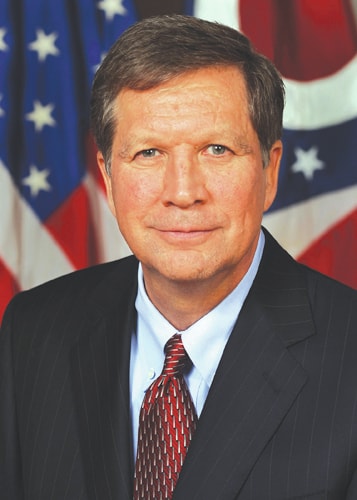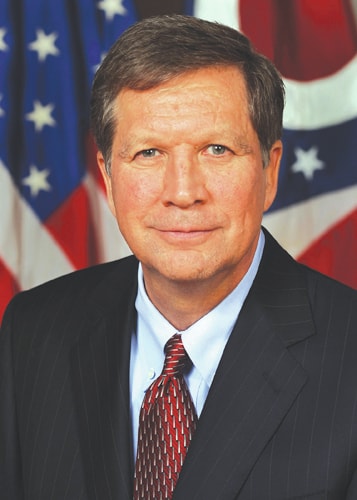

COLUMBUS, Ohio (AP) — Ohio Gov. John Kasich issued a series of vetoes Tuesday, including one to a bill that would have made compliance with the state’s renewable energy mandates optional for the next three years.
Barring a legislative override, the Republican governor’s action on the energy measure will resume benchmarks established in 2008 that were gradually increasing electric utilities’ use of alternative energy sources such as wind and solar power. The standards also require utilities to find measurable ways for consumers to reduce their energy use.
Kasich also vetoed a tangible property tax exemption for Ohio’s oil-and-gas industry and a bill expanding legislators’ power to abolish state agencies and departments.
Lawmakers have until midnight Saturday to override his vetoes, which also include striking down a so-called heartbeat bill banning most abortions as early as six weeks into pregnancy, at the first detectable heartbeat. Overrides require a three-fifths supermajority of both legislative chambers.
Here’s a closer look at Tuesday’s vetoes:
Clean energy
Kasich’s veto of optional standards brings back mandates on the use of renewable and alternative energy that had been phasing in since 2008.
In a 700-word veto message, Kasich supported the objectives of the original law, passed under former Gov. Ted Strickland, a Democrat. The law required utilities to generate 25 percent of electricity from alternative and advanced sources such as solar, wind and clean coal by 2025.
Sen. Bill Seitz, a Cincinnati Republican, has said the bill making compliance with the state’s renewable energy mandates optional for the next three years was needed to allow time for federal regulations to be sorted out. More than half of U.S. states have challenged implementation of the federal Clean Power Plan in an ongoing legal battle. The plan’s fate under President-elect Donald Trump isn’t yet clear.
Renewable-energy companies and environmental advocates backed the veto, calling the optional mandates just a freeze in another form.
Oil and gas tax break
Kasich vetoed a legislative provision that would have delivered a $264 million tax break to Ohio’s oil-and-gas industry.
It was one of three items he struck from a larger bill that saw 20 amendments in a last-minute legislative flurry on Dec. 8.
It would have expanded the sales-tax exemption on drillers’ tangible personal property and made the change retroactive to June 30, 2010.
The Ohio Department of Taxation estimated refunds would have cost the state $215 million and local governments $49 million.
Lawmakers behind the change said the tax was misapplied to certain property for years. An industry lobbyist said the language simply clarified current law.
Agency review
Kasich struck down legislation that would have allowed Ohio lawmakers to more easily do away with state agencies and departments.
The proposal affected at least 25 departments in the governor’s Cabinet. Among them are agencies charged with paving roads, monitoring clean water, regulating dangerous wild animals and funding schools.
Critics of the plan said it was a risky approach that could have created gridlock and allowed lawmakers to hold departments “hostage” in political maneuvers. Its backers said it sought to improve accountability and efficiency in state government.
Under Ohio’s current sunset review law, agencies generally are subject to review but state departments aren’t.
Other tax provisions
Kasich also line-item vetoed two other tax provisions from the larger tax bill.
One item would have allowed municipalities to keep unspent grant money set aside for hosting major sporting events from year to year.
The other would have exempted digital music, multimedia and books from sales taxes when they were purchases through an amusement or entertainment device, such as a jukebox or arcade machine.
Ohio recently changed its law to impose state and local sales on such digital products, and Kasich believed the provision was watering down the tax change’s effect.





